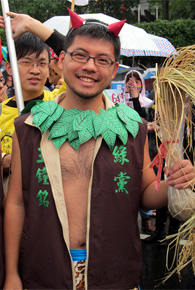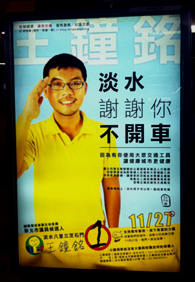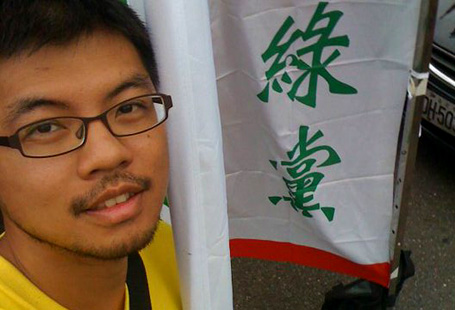Thirty-two-year-old Wang Chung-ming is a Green Party candidate running for a councillor seat in the the Shihmen, Sanjhih, Bali and Tamsui districts in Xinbei City (formerly Taipei County).
He said he decided to take the plunge after failing to find a gay candidate to represent his party of which he is a Central Executive Committee member. The centerpiece of his campaign platform however isn't LGBT-related issues but agriculture, green transportation and local economy.
As an active member of the LGBT community, Chung-ming is involved in a group that addresses issues facing aging gays, and hearing impaired LGBT people. He says: “If we look carefully at marginal LGBT issues, we will find that sexual orientation or gender identity may not be the most important problem for them but their problems are compounded because they are LGBT. The truth is, if we all look at ourselves, we will find out that there are several identities within ourselves but most of time there will be one identity which is more important than others.”
He adds that regardless of the election results, his involvement in politics has become his life's career. Chung-ming tells Fridae how he had decided to run in the elections himself when he couldn’t find anyone who would do so, and more about his campaign.

Wang Chung-ming (王鐘銘)
Green Party Taiwan (台灣綠黨)
Member since 2006
Age: 32
Occupation: Editor of books and magazines / Politician
Contesting in: Shihmen (石門), Sanjhih (三芝), Bali (八里) and Tamsui (淡水) districts in Xinbei City (formerly Taipei County)
æ: Is this your first time running in the Taipei municipal elections or any other council?
Chung-ming: Yes, it is my first time running for any kind of political office.
æ: Can you tell us briefly how you became involved in politics and why are you running for council member??
Chung-ming: In 2006, some bloggers and I held some online events to help Green Party members in that year's municipal election. Unfortunately none of them won. I was so depressed by the results that it inspired me to get more involved and to join the party. This year, I think it is a good opportunity not only for Green Party but also for a LGBT candidate to win a council seat. However when I couldn't find anyone who would run in the elections, I decided to join the race myself.
æ: What do you think are the pros and cons in being an openly gay candidate? Do you find the mainstream public to be accepting of yourself and other openly gay candidates?

Chung-ming: Although I'm openly gay, my main policies in this campaign are not LGBT related but about green transportation, agriculture, and local economy. Hence most electorates see me as a young man who cares about environment first, then my gay identity. My multiple identities work in a very interesting way: Most non-LGBT electorates don’t seem to mind nor do they really care about my sexual orientation, but it appears that LGBT electorates are beginning to pay attention to environmental issues.
With regards to my election campaign, I don't see any inferiority or negative consequences in being openly gay. But it might be just because I'm optimistic. The advantage of being openly gay is that many people may admire my courage to come out, and I always get hugs and encouragement from my straight supporters.
However, I don't think the mainstream public accepts openly gay candidates. But we don't need the mainstream public. It only takes about 10%-20% votes to become a city councillor.
æ: What do you think are the three most important LGBT-related issues facing the city that you would address if you’re elected?
Chung-ming: (1) Gender equality in education: The bullying and discrimination based on sexual orientation and gender identity are still very serious issues in schools today. No matter peers, teachers or school staff, discrimination can be found in what they say and their attitudes when dealing with students. Therefore, to enforce/reinforce the existing Gender Equity Education Act (2004) in schools and promote gender equality education would be a priority for me.
(2) Partnership rights: Although same-sex marriage or civil union is a central government issue, local governments can play their part at the local level such as city government can recognise and register same-sex couples so that said couples can get social welfare benefits like child allowance and spousal benefits (at the local level under local government authority).
(3) Young, aging LGBTs and LGBTs with disabilities: LGBTs with special needs including those who are economically disadvantaged tend to have their problems compounded because of their sexual orientation. I feel the government has the responsibility to resolve their difficulties and cater to their needs.
æ: What do you think are the three most important non-LGBT-related issues facing the city that you would address if you’re elected
Chung-ming: (1) Agriculture: We need agriculture to save our lives, not only because of the food crisis but also because of the environmental and economical crisis. The district I’m running in has a very high potential to be developed to become a sustainable and self-sufficient model. I also believe that such a culture will be a greatly diverse one.
(2) Green Transport: We really don't need more roads and cars. Policies and plans to build more roads and high-speed roads should be better scrutinised. We should look to public transportation like buses, trains, bicycles and walking to play more important roles nowadays. Bicycling shouldn’t be seen as just a leisure activity or exercise but a way of transportation.
(3) Local Economy: Exchange, including service and goods, within a city, a town, or even a community will help us rely less on import and export.
Ashley Wu, Director of International Affairs, Taiwan Tongzhi Hotline Association contributed to this article.

